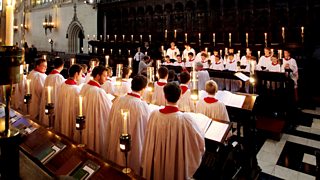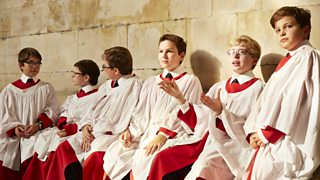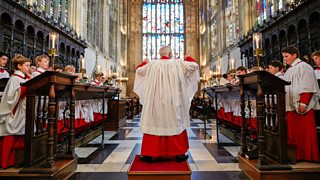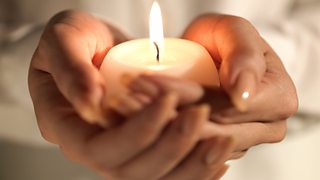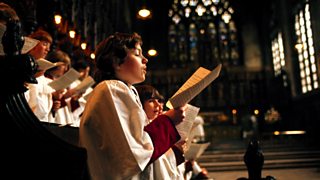Celebrating 100 years of Nine Lessons and Carols
2018 marked the centenary of both the WW1 Armistice and the Festival of Nine Lessons and Carols at King's College, Cambridge. The two events are linked by history, but the enduring popularity of the annual Festival – which is loved by millions around the world and for many, signals the true start of Christmas – has been sustained for the last 90 years following the ����ý's decision to begin broadcasting the service in 1928. This is its story.
The original Service of Nine Lessons and Carols first heard at King's College Chapel in Cambridge in 1918 goes back further in history, to a different time and location: Christmas Eve 1880, and a temporary wooden structure which in unlikely fashion was serving as the Cathedral in Truro, before work commenced on the current building.
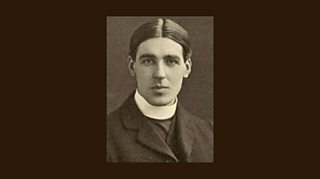
It was devised by E. W. Benson, the first Bishop of Truro and later Archbishop of Canterbury. His son A. C. Benson (who wrote the words of Land of Hope and Glory) recalled that his father, himself borrowing the idea from another Victorian cleric, Somerset Walpole, "arranged from ancient sources a little service for Christmas Eve – nine carols and nine tiny lessons, which were read by various officers of the Church, beginning with a chorister, and ending, through the different grades, with the Bishop."
But it was the vision of Eric Milner-White, Dean of King's College, Cambridge, harnessing the musical resources of the Chapel, which grounded a tradition and achieved instant popularity, spreading to schools, chapels and churches round the world.
Milner-White had been Chaplain to King's College in 1912; war service took him to the Western Front and to Italy, and he finished the war with a Distinguished Service Order. After resigning his commission early in 1918, he returned to Cambridge, and was made Dean of King's.
In the immediate aftermath of the First World War, Milner-White decided that A Festival of Nine Lessons and Carols would be a more uplifting occasion at King’s than Evensong on Christmas Eve.
Using Benson’s plan, he wrote the now classic Bidding Prayer which sets the tone at the beginning, after the lone chorister was sung the opening verse of "Once in Royal David's City".
As the preface to the 2018 Festival's Order of Service states, "Wherever the service is heard and however it is adapted, whether the music is provided by choir or congregation, the pattern and strength of the service, as Milner-White pointed out, derive from the lessons and not the music. ‘The main theme is the development of the loving purposes of God …’ seen ‘through the windows and the words of the Bible’.
"Many of those who took part in the first service must have recalled those killed in the Great War when it came to the famous passage in the Bidding Prayer, recalling ‘all those who rejoice with us, but upon another shore and in a greater light’.
The simple, universal appeal of the Festival is described thus: "The centre of the service is still found by those who go ‘in heart and mind’ and who consent to follow where the story leads."
The Festival on Radio and Television
The ����ý has broadcast the Festival of Nine Lessons and Carols on radio every year since 1928, with the exception of 1930. Broadcasts even continued during WW2 after the Chapel's stained glass had been removed for safety and there was no heating. During the War, the venue was not disclosed on-air. Since the mid-1960s, a separate service, Carols from King's, has been pre-recorded for television.
The Festival of Nine Lessons and Carols is broadcast live at 3pm on Christmas Eve on ����ý Radio 4 – for many, an essential "appointment to listen" forming part of family Christmas celebrations. The service is repeated, with the concluding organ voluntaries heard in full on Christmas Day at 2pm on ����ý Radio 3.
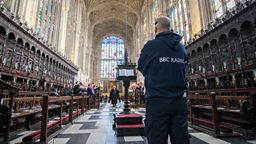
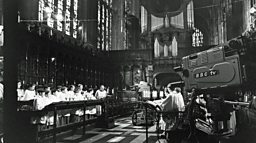
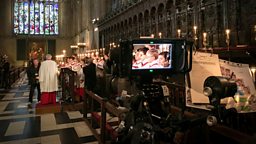
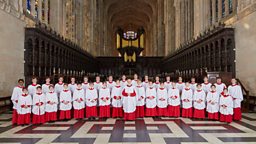
It is reported that the Chapel's then Director of Music, Arthur Henry Mann, who had been in post since 1876, was less than enthusiastic about the new form of service, but he survived in post long enough to see the first broadcast, in 1928.
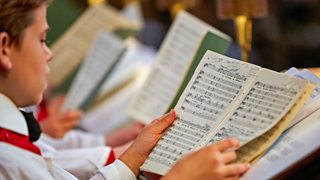
Since then, the Festival of Nine Lessons and Carols has cemented the Chapel Choir's international reputation, under successive Directors of Music: Boris Ord, Harold Darke, Sir David Willcocks, Sir Philip Ledger and, since 1982, Stephen Cleobury, for whom the 2018 service marks his retirement.
Since 1982 Stephen Cleobury has commissioned at least one new carol each year on behalf of the College for the Choir. The first commission was In Wintertime, from Lennox Berkeley and a succession of distinguished British and international composers writing in various syles, including Thomas Adès, Harrison Birtwistle, John Tavener, James MacMillan, Judith Bingham, Diana Burrell, Thea Musgrave, Arvo Pärt and Einojuhani Rautavaara have have added carols to the repertoire.
In 2018, the Master of the Queen's Musick, Judith Weir, enjoys the distinction, along with Richard Rodney Bennett and John Rutter, of a second commission: O Mercy Divine.
-
![]()
A Festival of Nine Lessons and Carols
Recorded in the majestic beauty of the 15th century chapel of King's College, Cambridge. Christmas carols and hymns sung by the world-famous chapel choir.

-
![]()
A Festival of Nine Lessons and Carols on Radio 3
A Christmas Day broadcast of the complete Festival service, with the concluding organ music.
-
![]()
Once in royal David's city – stepping up for the great solo
Former King's College choristers share their experiences of that heart-stopping moment.
-
![]()
Something Understood
Exploring the larger spiritual questions of life through music, prose and poetry.
-
![]()
Choral Evensong
Live broadcasts of Evensong from around the country, on ����ý Radio 3.
